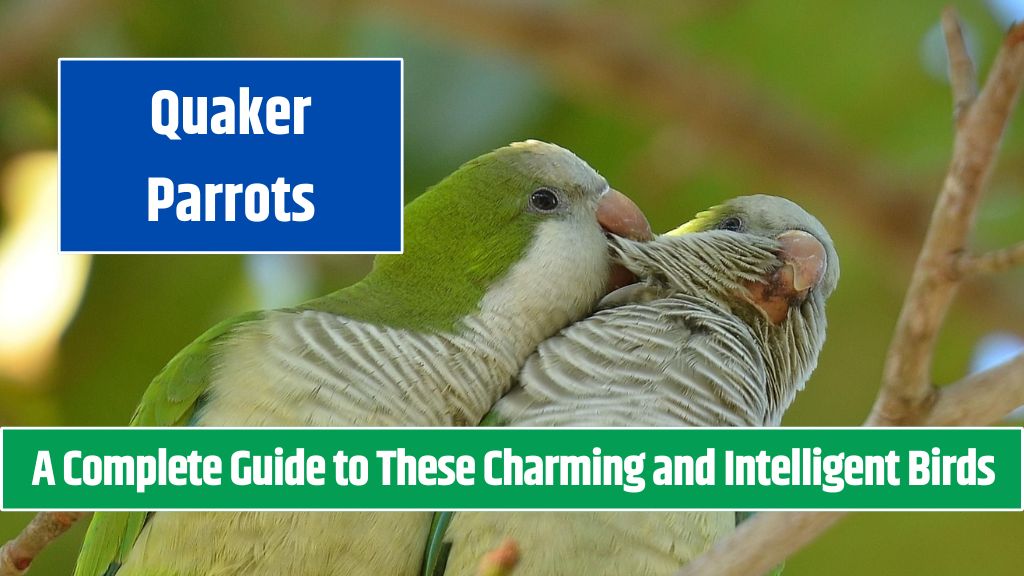Quaker parrots (Myiopsitta monachus), also known as monk parrots or monk parakeets, are well-known for their playful, affectionate personalities and exceptional intelligence. Often referred to as the “clowns” of the bird world, these energetic birds are loved for their comical antics, clear talking ability, and strong bonds with their owners.
However, Quaker parrots require attention, commitment, and proper care to thrive. Before bringing one into your home, it’s essential to fully understand their needs, behavior, and legal status in your area.
Why Are They Called Quaker Parrots?
There are several theories behind the name “Quaker” for these birds:
- Some believe the name comes from the gray patch on their necks, which resembles an old-fashioned Quaker bib.
- Others suggest the name reflects their “quaking” movements—a distinctive shaking or bobbing motion, particularly noticeable when they are excited or begging for food.
- The alternative name, monk parrot, is thought to refer to the gray coloration that resembles a monk’s hood.
Physical Characteristics of Quaker Parrots
Quaker parrots are medium-sized birds, making them a great choice for people who want a parrot but don’t have space for a large bird like a macaw.
Species Overview
- Length: 11 to 12 inches
- Weight: 3 to 5 ounces
- Coloration: Bright green feathers with a grayish chest and a greenish-yellow belly
- Lifespan: 20 to 30 years, with proper care extending their lifespan beyond 30 years
Personality and Behavior
Quaker parrots are known for their fun-loving, energetic, and spunky nature. They are highly social and form close bonds with their owners. However, their need for attention means they can become aggressive or develop unhealthy behaviors like feather plucking if they feel neglected or stressed.
Key Traits
- Highly intelligent and quick learners
- Can mimic human speech clearly, often rivaling larger parrots
- Loyal and affectionate, typically bonding closely with one person
- Love to build nests, even when kept alone
- Active and playful, requiring plenty of stimulation
Talking Ability
If you’re looking for a talking parrot, the Quaker parrot is an excellent choice.
- They can develop an impressive vocabulary and speak clearly.
- Quakers are known for mimicking everyday sounds and human speech.
- While not every bird will learn to talk, Quakers have a higher success rate in learning speech compared to many other parrot species.
Their vocalizations are not as loud as larger parrots, making them suitable for apartment living, though they will still make their presence known with regular chattering.
Diet and Nutrition
Quaker parrots need a well-balanced diet to avoid common health problems like obesity. Their diet should mimic what they would eat in the wild, including:
- Pellets: A high-quality commercial pellet should make up the majority of their diet.
- Fresh vegetables and fruits: Offer fresh greens, carrots, apples, and berries regularly.
- Seeds and nuts: Provide healthy seeds and nuts in moderation (limit high-fat options like sunflower seeds and peanuts).
- Millet: Occasional millet treats are fine but should not be overused.
Overfeeding fatty foods can quickly lead to weight gain, so portion control is essential.
Housing and Care Requirements
Although Quakers are medium-sized birds, they still need plenty of space to move and play.
- Provide a spacious cage made from bird-safe materials.
- Ensure the cage has secure locks, as Quakers are intelligent and can learn how to open cage doors.
- Offer plenty of toys and nest-building materials to satisfy their natural instincts.
- Allow daily out-of-cage time for physical exercise and mental stimulation.
Training and Socialization
When you bring a Quaker parrot home, it’s normal for the bird to feel nervous or anxious.
- Spend time near the cage, talking softly to help them adjust.
- Gradually introduce your hand into the cage once the bird seems comfortable.
- Use treats as positive reinforcement during training.
Quakers are social birds and do best when they have regular interaction, either with their human caretaker or another bird.
Lifespan and Long-Term Commitment
Quaker parrots live an average of 20 to 30 years, but with proper care, some can surpass 30 years.
- Be prepared for a long-term commitment when adopting a Quaker.
- Their strong bonds mean frequent changes in living environments can cause stress and behavioral problems.
- Regular veterinary checkups, proper nutrition, and daily interaction are essential for their well-being.
Legal Considerations
Before adopting a Quaker parrot, check the laws in your state. Due to their ability to form wild colonies, Quakers are illegal in certain states in the United States, including:
- California
- Colorado (if purchased after 1990)
- Connecticut
- Kentucky
- Pennsylvania
- Georgia
- Hawaii
- Rhode Island
- Tennessee
- Wyoming
Make sure to verify local regulations before purchasing or adopting a Quaker parrot.
Quaker parrots are intelligent, affectionate, and entertaining companions for the right owner. While their playful personalities and clear-speaking abilities make them a favorite among bird enthusiasts, they require consistent care, attention, and stimulation to thrive. If you’re prepared for a long-term commitment and live in a state where they’re legal, a Quaker parrot can bring joy, laughter, and companionship for decades.
FAQ’s
Why are Quaker parrots called ‘Quakers’?
Quaker parrots are named for their distinctive ‘quaking’ or shaking motions, especially noticeable when they are excited or begging for food. Some also believe their name comes from the gray bib-like pattern on their chest.
How long do Quaker parrots live?
Quaker parrots typically live between 20 to 30 years, though with proper care, they can live beyond 30 years in captivity.
Are Quaker parrots legal in all states?
No, Quaker parrots are illegal in several states including California, Colorado (if purchased after 1990), Connecticut, Kentucky, Pennsylvania, Georgia, Hawaii, Rhode Island, Tennessee, and Wyoming.
Can Quaker parrots talk?
Yes, Quaker parrots are known for their exceptional ability to mimic human speech and can develop a diverse vocabulary. They are considered one of the best talking parrot species.
What do Quaker parrots eat?
Their diet should consist of high-quality pellets, fresh fruits, vegetables, and occasional seeds or nuts. It’s important to monitor their diet to prevent obesity.











